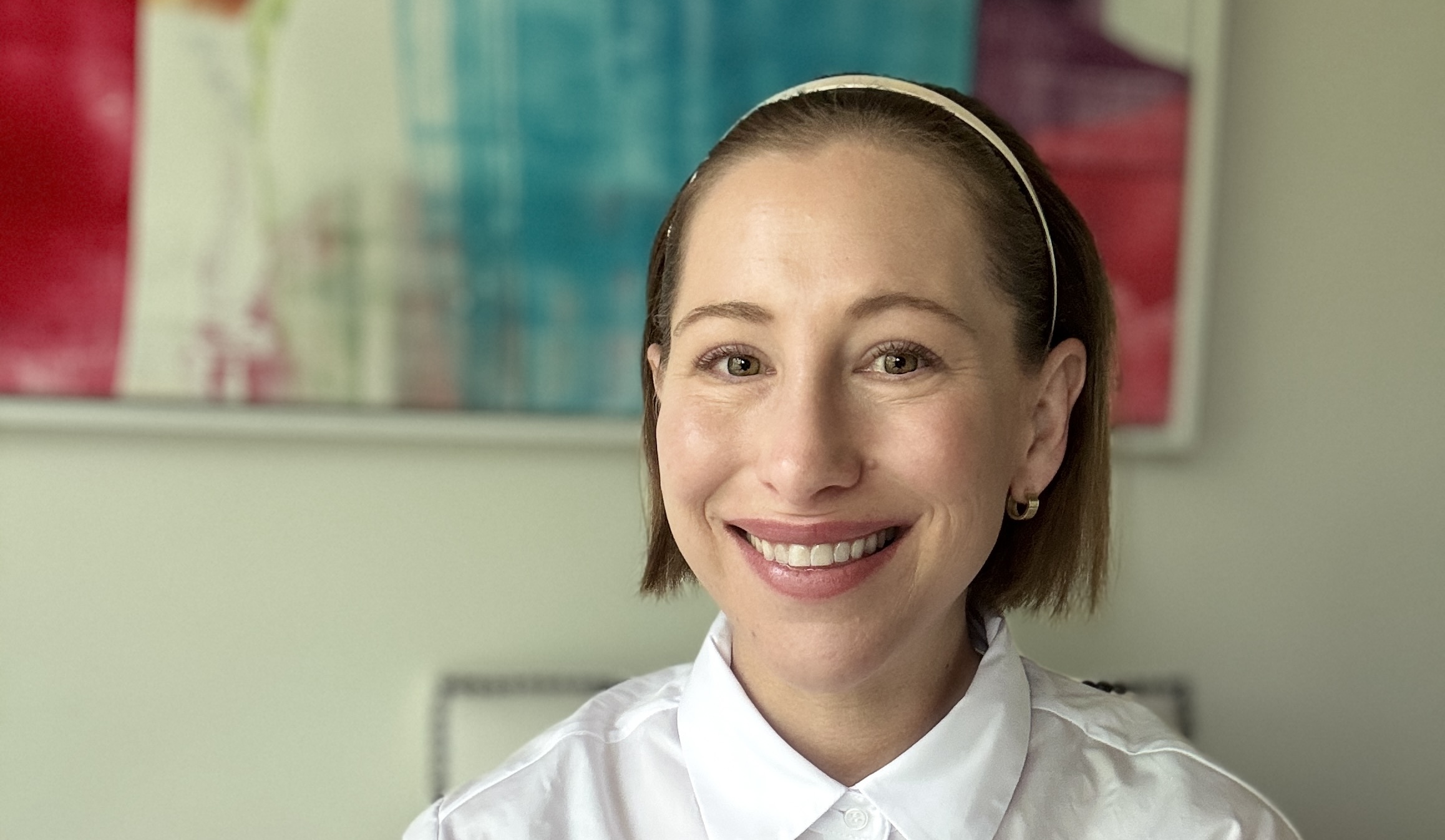
May 2025
When Lexi recorded her story for us, her introduction was straight to the point: “Hi, I’m Lexi. I’m 39 years old. I live in Chicago, and I am a wife, a mother, sister, daughter, friend. And I have Stage 4 non-small cell lung cancer.”
Two years ago, Lexi noted she was struggling with pain in her left shoulder along with extreme weight loss “which I attributed to stress and just feeling like I was on a hamster wheel between work and kids and anything else going on.” With the weight fluctuation, “I didn’t put too much stock into it because I was having babies, and losing weight from the babies, and then gaining weight for the babies. But I really started to know that something was wrong when I was starting to feel severe pain in my left leg. I started limping.”
People noticed. Her co-workers were concerned and would often ask her if she was okay. Then Lexi’s husband went on a business trip. Without his help, she realized how difficult it was to physically lift her infant son, get him into his sleep sack, and into his crib. “My body was wrecked. I felt like – wow, I am 37 and a healthy person. How is my body in such a state?”
When he returned, she was lying on the floor of their family room, which was the only position she found comfortable. Her 8-year-old daughter came and stood over her. “She said, ‘Mom, if I was in this much pain, you’d be taking me to see a doctor.’” After months of worsening pain, that was what finally spurred Lexi into action.
Hear Lexi talk about the symptoms that led to her lung cancer diagnosis.
Getting a diagnosis
Her brother-in-law, a physician, recommended she start with an orthopedic surgeon. An X-ray indicated hip dysplasia, and she was told she’d probably need a hip replacement in 20 years or so. In the meantime, she was directed to start physical therapy. If the pain continued, she would have an injection with an MRI.
She recalls saying, “It’s really bad, and I’m too young for this. It feels pretty severe. Can we just get that MRI?”
The doctor was reluctant but decided to refer her given how much difficulty she had walking. “They happened to have imaging in the same little medical complex that I was in,” Lexi explained. “I went down and tried to schedule my MRI, and the woman there said, it takes us three days to process the order and then we can schedule you after that. And I was like, look, you’re here. I’m here. Nobody else is here. I mean, the place was empty. It was the Friday before Thanksgiving. She kind of laughed and said, okay, gimme a second. She messaged the tech in the back, and they said, ‘We’ll take her.’”
After the appointment, Lexi felt energized. She was taking care of her health issue, staying on top of her job, and had done all her shopping for Thanksgiving. “We were getting ready to have a nice week. Then, three hours later, the orthopedic surgeon called me and said, ‘You have a massive tumor in your left leg, and a smaller one in your hip. You cannot put any weight on it, or it will break. You need to come in right away and get fitted for crutches, and you have an 8 AM appointment with the orthopedic oncologist on Monday.’”
Lexi was beyond shocked – that weekend, she was a bundle of stress and emotion. When Monday came, the doctor told her he was hoping she had lymphoma. On Wednesday, she had a bone biopsy.
The next day “was pretty tough, but I was determined to give my kids the sort of familiar flavors that they know and love. My husband set up a table and a chair, and he was my sous chef, and he went and got everything for me. But it was a pretty somber Thanksgiving. There was a big weight and heaviness to it, and we just didn’t know how worried to be.”
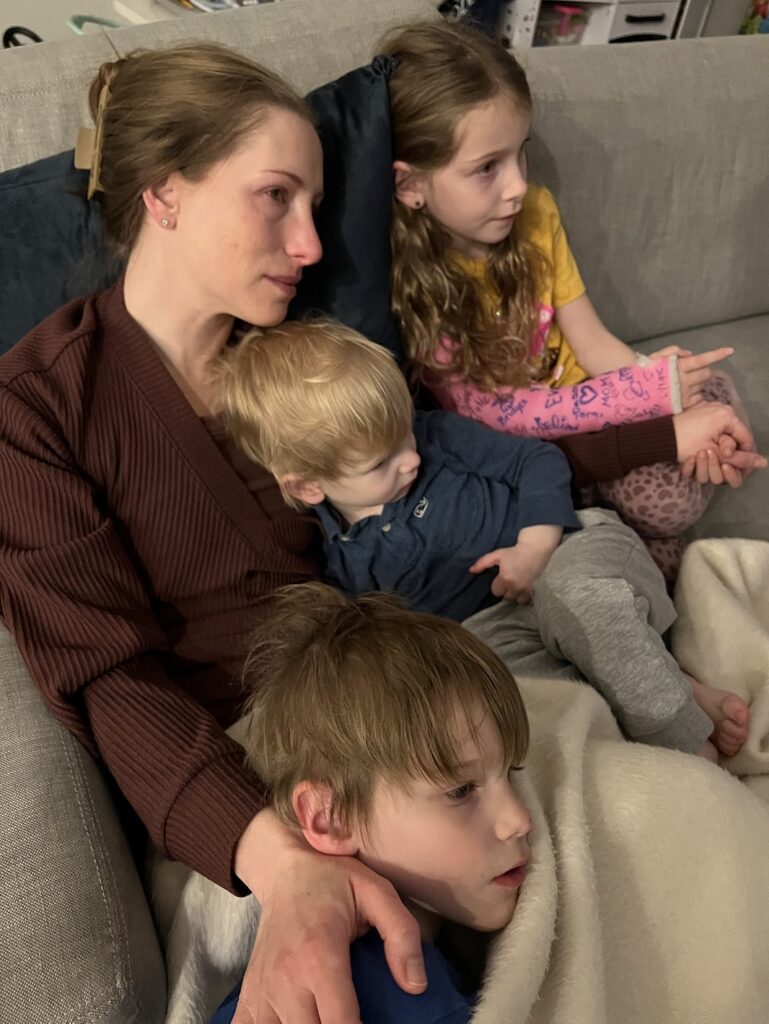
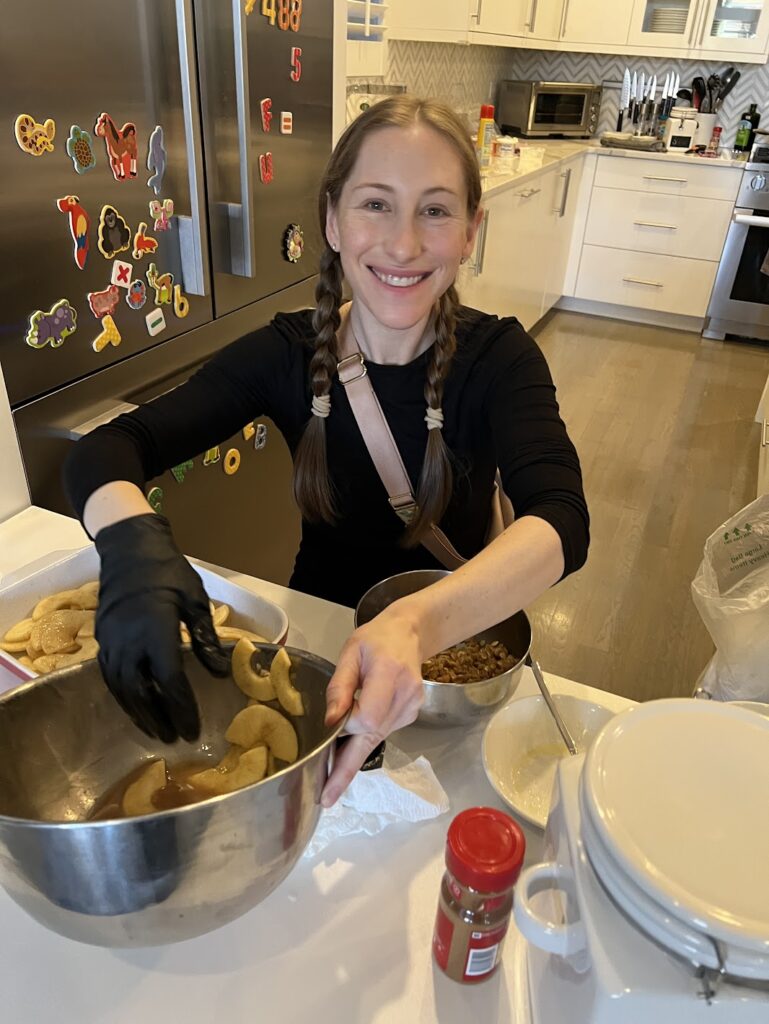
The initial results came in the following Tuesday, showing metastatic adenocarcinoma consistent with lung cancer. Seeing the shock on Lexi’s face, he explained that they were seeing increased incidence of lung cancer in young women with no history of smoking. Lexi had no idea. “I was in shock and disbelief and was adamant that it must be something else.”
“I knew very little about lung cancer. I was taught the same thing that many of us were taught growing up – don’t smoke, you’ll get lung cancer, or your lungs will turn black. I certainly didn’t know anyone who had lung cancer who had never smoked.” She assumed it was one disease she didn’t need to worry about.
“I’m seeing that so many other people in my sphere who hear about this are equally shocked,” she said. “And then you have the attempt of spreading awareness and advocating for people who have this disease. A lot of that happens on social media, so I’m involved with a couple of organizations where we talk about this, and in the comments – which I try not to look at – there’s this immediate attempt to try to identify cause or reason in a way that I don’t really see with other cancers. They think there must have been some sort of behavioral component to this. Most people still hold onto that belief and that stigma, and they can’t wrap their heads around the fact that the reality is that anybody who has lungs can get lung cancer.”
“We have to start to change the conversation, and we have to continue to advocate and bring awareness and say, I don’t blame you for being surprised and shocked. The reality is that it’s random. I came into contact with something at some point in my life that my body held onto and cells mutated. And this happened.”
Telling children about cancer
Lexi is grateful for her support system: her husband, her mom, her sister, and her close group of friends. They have ”stepped up and want to rally around me in a way that I don’t feel is necessarily deserving. But I am so thankful for it.”
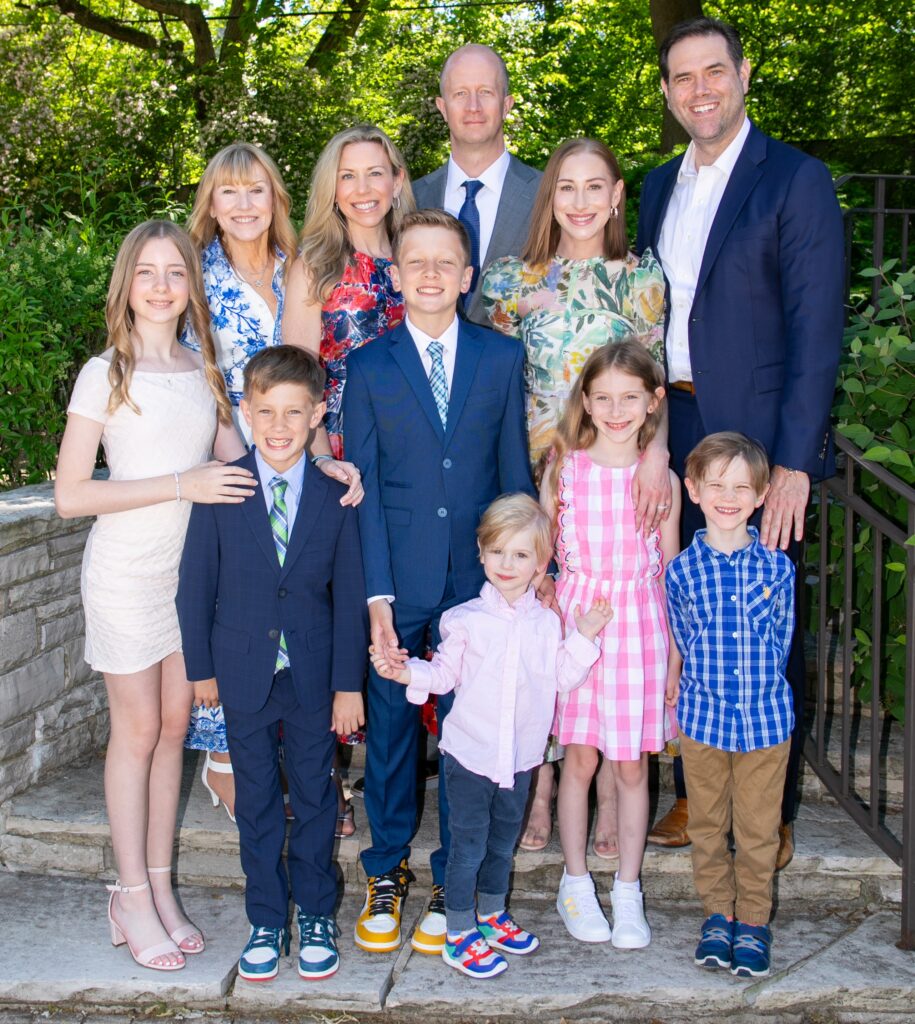
“My kids understand what is going on for what is appropriate at their age to understand,” she said. “My oldest knows more than my middle, who knows more than the youngest – who just kind of knows that mommy has some booboos and gets tired some days.”
“You know, I carry a lot of guilt. I feel bad that I am putting something so heavy on my kids so young and before they really needed to have anything heavy. So maybe this is advice for myself in addition to other people, but I’m trying to let go of that guilt. Because this is our new normal, this is our new reality, and my goal is to show them that mom is going to do everything that she can to try to overcome it – try to fight it – because I want to be there for them.”
She feels honesty is important – at a level the child can understand. “Try to meet them where they are in terms of giving them enough information to understand what’s happening – because your life will change, and it will look different and everybody has to adapt and make it work.”
“Life still goes on – the kids are still going to fight, and I’m still going to have to step in, and there’s still going to be moments where you love them to pieces and they get on your nerves, and all the things are still true. None of that goes away because you have cancer and have a terminal diagnosis. Life still happens.”
Patient advocacy and kindred spirits
Lexi didn’t know anyone else whose life looked like hers. “It was very helpful to have found a patient advocacy group dedicated to not only people who have lung cancer, but young people who have lung cancer,” she said. “That was really wonderful in terms of just feeling like I wasn’t alone in this.
When I was in the doctor’s office, I was 40 years younger than most of the people there. And you feel very alone. It’s helpful to have people around you, who you can feel like you’re in the same boat – who you can share experiences with, who you can share advice with.”
She follows LCRF and other groups on social media, and finds it helpful to see the statistics and information being posted. “All of that information arms me to be a better advocate for myself when I am talking to my medical team so that I can say, ‘Hey, I’m seeing X, Y, Z, what do you know about it?’ It also helps me share and spread additional awareness to other people in my sphere.”
Lexi shared LCRF’s posts Lung Cancer Awareness Month last November. “People would respond, and they were shocked at some of the statistics that they were seeing – that it’s the leading cancer that impacts women. There are just some things like that that I think are really powerful statements, that are useful to not only help spread knowledge, but dispel some of the stigma that’s associated with lung cancer.”
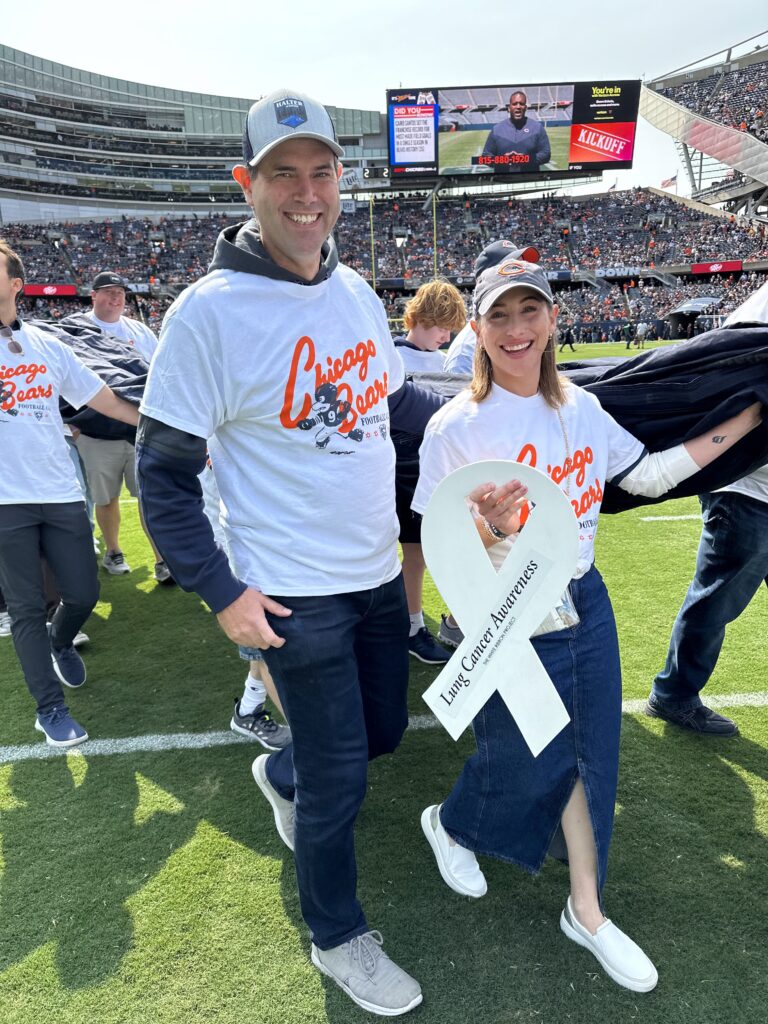

Lexi first heard about LCRF’s Free to Breathe Walk about a month after her diagnosis, when her sister was trying to find lung cancer related events in Chicago. While they had missed the 2023 walk, her sister suggested they sign up in 2024. “It was always kind of in the back of my mind, but with my leg, it’s hard to walk for long periods of time,” Lexi explained. “Then, with the barrage of treatments that I was getting, I was not feeling great at all. It just felt like it couldn’t happen. There was something insurmountable about being able to walk for that period of time and also create a team and do the fundraising.” Then, about a month before the walk, “I was feeling good at the moment. And I said to my sister, let’s do it.”
They only had a few weeks to plan, and Lexi thought their team might end up being immediate family only. To their surprise, “in less than a month, we had raised over $7,500 and had 50 people come and walk at the event. I felt very accomplished that I could walk that amount, and it was great. It felt really uplifting, hopeful, and inspiring.”
To her surprise, her entire team of doctors was there, too. “I saw them and cried. I’d never seen them outside of the hospital. It just felt like we were doing some good, we were making some progress forward to something.”
> Learn more about the Free to Breathe Walk
> Find a patient support group
She also met a patient who serves on LCRF’s Board of Directors. “She was seeking me out to say hi and was just so nice and warm. Another thing about this community of people is – it’s so devastating that we have to meet under these circumstances, but I’m meeting some of the most amazing people that I never would have known in my life. And the people who I meet, they’re tenacious and in the best possible way, they have ambitions to live – and want to do good.”
The LCRF walk was the first event Lexi had been part of since her diagnosis just under a year earlier. She felt she was reclaiming her power. “Someone else I was talking to said, ‘I feel like there’s so many type A women here, and so many similarities between so many of us.’”
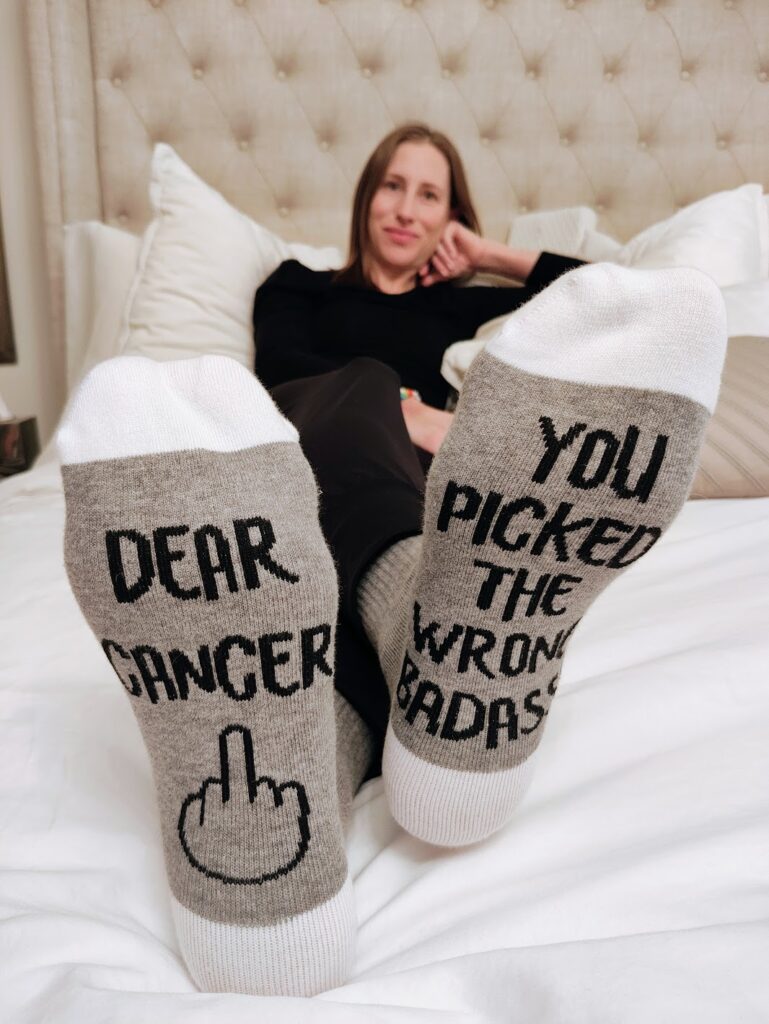
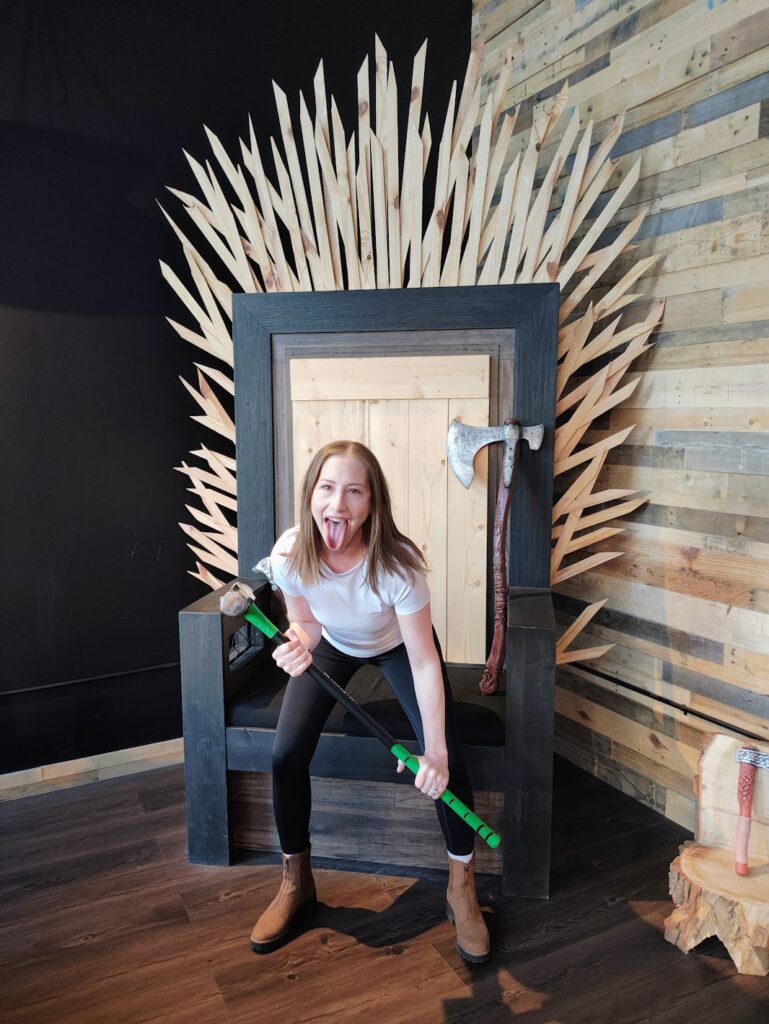

A whole person
Lexi has had chemotherapy and targeted therapy, has taken part in a drug trial, and finally had the primary mass in her lung surgically removed. “My doctor is really great about adjusting course as necessary, as new information, data and trials are available.”
Still, Lexi feels that patients are often discussed in a clinical way that focuses on treatment details at the expense of the person being treated. “It isn’t just the impact that this drug is having on my body, but what it’s doing to my life,” she explained. “There are certain drugs that I’ve had that make it impossible to get through your day, just even in terms of – I can’t put on pants because my fingers are so cut up. I can’t even pull pants on without them bleeding. Or I can’t zip up my kids’ backpacks again because of my hands, or I can’t eat something because of mucositis in my mouth with the sores. When you say, ‘this person has grade three mucositis,’ that doesn’t accurately convey and portray what you’re really dealing with.”
“I’m not just a 39-year-old female with metastatic adenocarcinoma, EGFR, exon 20, you know, dah-dah-dah. I’m a person, I’m a human, and I am trying to recover from this diagnosis in the most graceful way that I possibly can – and still be able to be a person to show up for my kids and my husband and my family and my friends and myself.”
She knows that scientific research is her best hope for the future. “I’m keeping my eye on all the drugs, and we’ll see what gets approved. For Exon 20, there are not a lot of options necessarily in terms of targeted drugs. I’m trying to think about long term as much as I can – what am I doing now, and how will that impact long-term survival.”
> Read about the latest science
> Get resources on living with lung cancer
> Donate to further lung cancer research
